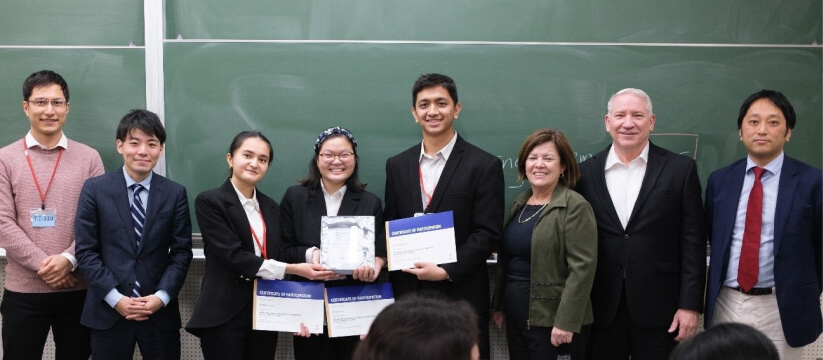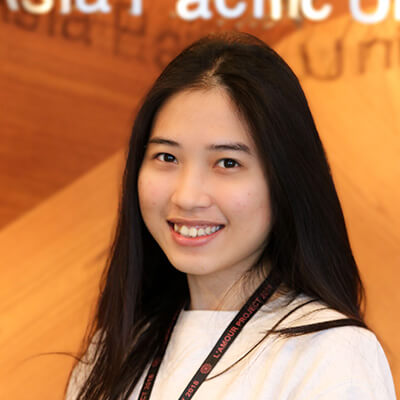10min read
In a remarkable feat that showcases the knowledge, dedication, and resilience of our students, the APU team emerged as champions in the Japan Round of the International Humanitarian Law (IHL) Role-play Competition 2022 under the guidance of Assistant Professor Miharu Hirano. Their triumph not only signifies the team’s exceptional skills but also serves as an inspiration to our fellow students at APU. In this blog article, we will delve into the team's incredible experience, the range of emotions they encountered, the challenges they overcame, and the valuable messages they have for our aspiring students.
Winning APU team members of Japan Round of ICRC International Humanitarian Role-play Competition:
GHOZALY Ghiandi Amna (APS 4th year, Indonesia)
SATIMBOEVA Rukhsora (APS 4th year, Uzbekistan)
NGUYEN Thu Thuy (APS 4th year, Vietnam)
The International Humanitarian Law (IHL) Role-play Competition organized by the International Committee of the Red Cross (ICRC) Japan took place at the University of Tokyo (Komaba campus) on December 10, 2022. In the role-play competition, participants are given roles such as humanitarian aid worker, governmental officer, etc. where they are required to carry responsibilities and act in the given fictional scenarios. By emerging as the winners of the national qualifier for the role-play competition, the APU team secured a fully-funded ticket to represent Japan in le Concours Jean-Pictet, the most renowned role-play competition in the field of international law. The 40th edition of this event took place in Durrës, Albania, from February 25 to March 4, 2023.
1. How did you learn about the competition?
Team: If I can recall correctly, the announcement of the ICRC’s International Humanitarian Law Role-play Competition was given to us early in our seventh semester. There were two competitions organized by the ICRC, which were the Moot Court and Role-play. While Moot Court competition was leaning towards a more formal, strictly-structured and in-depth legal debate, Role-play Competition was more practice-oriented and involved the spontaneity and unrestricted response that makes it more "creative". Within Dr Hirano’s seminar, there's a very strong encouragement to not only practice academic writing but also to participate in competitions in order to make use of the knowledge we learned in the classroom and gain practical legal experience. He possesses a legal background and a proven track record in prestigious moot court competitions, which equips him with the requisite expertise and experience to offer invaluable advice. Since the third year, there have been offers for interested students within the seminar class to voluntarily participate in different competitions. In our case, we probably received the invitation to participate around August and the competition was in December of 2022.
2. What motivated you to take this opportunity?
Thu Thuy: I first got to know the competition from a senpai who was also in Dr Hirano’s seminar. She participated in this competition and they won the previous year. It was after Ghozaly and I completed our participation in the Asia Cup International Law Moot Court Competition that I found myself highly energized and genuinely interested in the IHL Role-play competition
Ghozaly:I think for me, it was about stepping out of my comfort zone and gaining experience. Essentially, the ICRC’s competition was about IHL. As we are not law students, we didn’t have a strong legal background. At least for me, it was twice as hard to process all of these new terms and information, and we could not have done it without the help of our Professor. I thought the experience of trying to participate in something that's new and rather foreign in my studies was just exciting.
Rukhsora:As a student approaching the end of my third year, I had started to wonder about what path I wanted to choose after graduation. At that point, I understood the fact that unless a person tries something new out, that person will not understand whether a certain field or certain activity is for them or not. So with that mindset, I aimed at an opportunity of trying out different “hats” within the IHL field.
3. How did you prepare for the competition? Can you describe the training and practice sessions you went through leading up to the event?
Team:There was a 2-step process, the first one was called “building the blocks” of the subjects that we were getting in. As we received information about the problem that was going to be discussed in the simulation from the Competition organizers, we read it and started building the blocks, referring to specific, relevant parts of IHL using mainly textbooks. After that, we made up a couple of simulation scenarios and did the role-play practice based on them in the library which was really fun. We made a track sheet on Notion to oversee the process so that everyone of us knew what we were doing and what we were up to. Our Professor also participated in some of these practice sessions in which he provided us with helpful and constructive feedback on both the legal and non-legal aspects. Sometimes we did our practices outside of campus as well and had our roommates or third-year students help us play different roles while we tried to act out our roles.
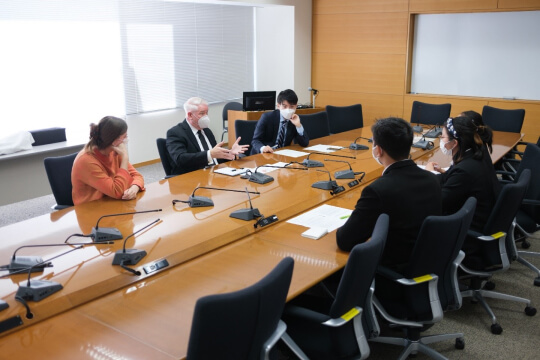
Photo credit: Aaron Sheppard
4. What were the strengths of your team that contributed to your success?
Team:On top of our weekly discussions, and later on having more frequent meet-ups, we generally have a very open-minded attitude towards each other's opinions and ways of working. We have an effective communication style which is perceived to be more suitable in this field based on the perspective of the judges. In addition, Dr. Hirano provided valuable guidance regarding the practical aspects of our arguments. He emphasized the importance of supporting our points with relevant laws and frameworks while also encouraging us to consider real-life situations and incorporate practical elements into our reasoning. Through this approach, we learned how to enhance the persuasiveness of our arguments.
5. Assistant Professor Miharu Hirano from the College of Asia Pacific Studies supervised your team. How did his guidance and support contribute to your performance in the competition?
Team:Dr. Hirano understands his position as a mentor, with regards to the competition. He doesn't show you the map to everything but he does give you hints of where you should go next or where you should be at a certain point. Before the competition, he acted more as a consultant/coach. We had bi-weekly scheduled meetings to discuss where we were at, what we were doing and sometimes we talked about case studies, or to further our knowledge on the legal aspects. I think a lot of the scenarios that we used during the practice simulation were more of his contribution than ours as we were not so familiar with the expectation or the agenda of the role-play competition. During the competition, our coaches were allowed to watch the performance of their students. For that, after each performance, Dr. Hirano would gather us for reflection and feedback, in which he gave so much helpful advice that we used throughout other simulations within the competition. He is a very considerate professor and he cares a lot about our wellbeing and mental health, so for us it has been a wonderful journey with him in or outside the classroom.
6. What were the challenges or doubts that you have to overcome?
Team: I think the most difficult part of the role-play competition was that we didn't know what to expect. During the preparation phase, you have to cover a wide range of legal rules because you don't know which one would be in the test. During the competition, we only had 30 minutes before going to the simulation, so we had to quickly flip our memory trying to find the most suitable rule, and that was the most difficult part. For the second challenge, it was how to ask the right question and how to answer the question correctly. For example, if you meet a prison guard or children in a detention center – you must be aware of how your tone of voice has to be, and how to push yourself to a certain limit while not going over your character.
In terms of doubts, again, we are not law students. All of the other teams from other universities were all law students who have access to law professors who have field experience in the ICRC and practice IHL in general. So, there was a doubt of not being able to match up to all of the other competitors. There were always small doubts throughout both the IHL Role-play Competition and le Concours Jean-Pictet, but we didn’t let that hinder our experience.
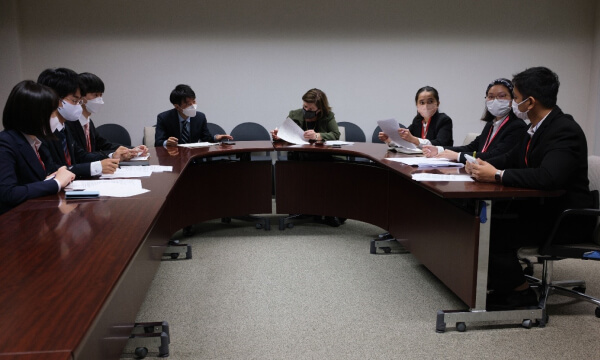
Photo credit: Aaron Sheppard
7. What do you think that you gained out of this experience?
Thu Thuy: I think that one of the most important things I gained from this is friendship and connection with other competitors and the judges. Because maybe one day, if I actually go into this field, these connections will be a very crucial part to build up my career path. Moreover, I gained a deeper knowledge and understanding of IHL by competing in these competitions. Last but not least, through this I found my future goal which is, for me, the most important takeaway. Many have described Jean-Pictet as a transformative and unforgettable experience, and I can attest to its profound impact on my life. It has provided me with clarity and direction, allowing me to discern the necessary steps to pursue my dreams and goals with confidence.
Rukhsora:I'll quote from Dr. Hirano, “participating in Jean-Pictet is equal to having a one-week intensive master's program in IHL”. And it was literally like that with a lot of specific topics of IHL being discussed in a very limited period of time. And when you have limited time, stress and rush, you tend to remember more, and certain things that we encountered during competition are still in our minds. And, by taking on different roles and putting on different hats within the competition, I also understood that the field might be too intense for me. IHL involves a lot of high-risk activities, especially if the person works in the field. I consider myself emotionally sensitive, so there was a realization that at this stage of my life IHL may not be the most suitable career path for me.
Ghozaly: I think from the beginning, I've been interested in refugee issues. Coming back from Jean-Pictet, it kind of reintegrated in me; what I wanted to do, and what I want my role to be in helping solve this problem. Jean-Pictet did really open my eyes a lot and it was such a lifetime lesson learned. It was humbling and inspiring to know that there are so many young people out there already learning so much and taking such big roles in helping people affected by war. It is an experience that I would easily say is a highlight of my university years that I will gratefully cherish.
8. What advice would you give to future students who are interested in international humanitarian law and considering participating in similar competitions?
Team:
- First of all, don't underestimate what APU gives you. Even in Multicultural Cooperative Workshop (MCW), I learned to utilize skills and experience from being TA to adapt them into the competitions. But also, step out of APU. APU will teach you a lot, so with everything APU equipped you with, step out and see what's out there. Let it inspire you, come back and then inspire and help other people.
- The opportunity to participate in such competitions is not just for international relations (IR) students, but students outside of this field of study or APM and ST students also have many similar competitions to join. Approach the professors that you think have the expertise and involvement in competitions, ask them for help, then build a team. And I'm 100% sure there's going to be a team out there that just needs to be compiled into one.
- Whenever there is an opportunity, just try to go for it and do your best. Even failures will teach you a lot. Compete for the knowledge, for the experience or the connections and lifetime memories that you can make.
- In every competition or anything that involves a team, teamwork is the foundation of a great result. Make sure that you are a team, not an individual.
- Be sure to be healthy physically and mentally, and communicate with your mates. Know your limits and make sure that you're not overwhelming yourself - I think that goes for everything that you do at APU.
9. Any last remarks?
Team:There are two aspects to humanitarian assistance: military and pure humanitarian. IHL sets out rules for both aspects, thus IHL is also referred to as "the laws of war". These rules are complied with most of the time which tends to stay unrecognized, but when IHL rules are violated they immediately catch the broader attention of the public and media. The above-mentioned have been a part of our learning experience over the course of our participation in IHL Roleplay Competitions. This brings in the fact that through such competitions, participants can not only gain simulated first-hand field experience, but also build well-rounded proper understanding of the IHL field. So if you happen to be interested in pursuing this discourse, feel free to reach out to us!
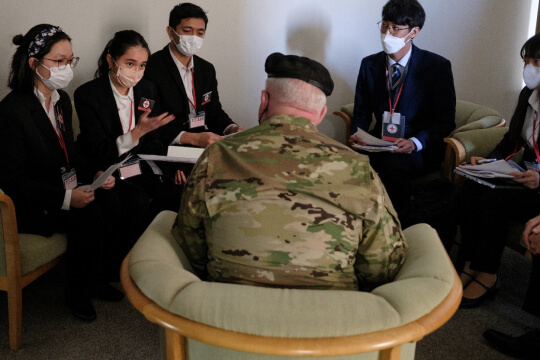
Photo credit: Aaron Sheppard
Conclusion:
The remarkable achievement of the APU team in winning the Japan Round of the International Humanitarian Law Role-play Competition 2022 and participation in the Jean-Picted Competition is a testament to their hard work, dedication, and exemplary skills. Their success serves as an inspiration for our students to pursue their passions, embrace challenges, and take advantage of opportunities that come their way. Let their story be a catalyst for our students to explore their potential and make a positive impact on the world.
VU Thanh Thao
After 2 years of studying online, I'm trying to figure out how to make the best of my undergraduate life at APU. My questions might be your questions, but my answers are your answers for sure! Live, laugh, last-minute-draft-is-the-best-draft (It's not). (Graduated in Sep. 2024)



